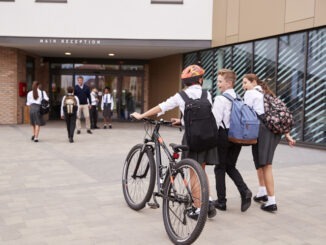
As reported by the BBC, schools in Wales are continuing to grapple with the impact of the COVID-19 pandemic, school inspectors have said
Estyn’s chief inspector of education said it hit basic skills and attendance, and pupils now need more well-being and mental health support. The report also found that progress towards implementing the new curriculum for Wales is ‘too variable’. It also said dealing with sexual harassment and bullying remains a challenge for all schools.
Most children have been back in school on a regular basis over the past year, which allowed the full impact of the pandemic to become clearer. It’s dented pupils’ numeracy and literacy skills, particularly oracy. Practical activities have suffered such as music and PE. There are more cases of persistent absence amongst pupils.
The pandemic also meant the use of spoken Welsh declined – in secondary schools, Estyn said it has had ‘a significant impact on pupils’ fluency and inclination to speak Welsh’, but there are some positives and there has been ‘gradual improvement’ in addressing the issues caused by the pandemic. Schools had to improve communication with families during lockdowns which has led to a better understanding of communities.
There has been ‘a notable increase in demand for well-being and mental health support’ but is is also an area where schools have upped their game, according to the chief inspector of education and training, Owen Evans. Secondary schools offer “strong support for pupils with specific emotional, health and social needs” and there has been “increased and more wide-ranging provision”, he said. Nevertheless it’s clear that addressing the growing demand for support is likely to be a major long-term challenge for schools and other services.
This is the biggest reform to Welsh education in decades, but Estyn said some schools are making much better progress than others.
Since the start of this school term primary schools and half of secondary schools have formally introduced it. The rest start in September 2023 but overall, progress is ‘too variable’. There’s a warning too that schools shouldn’t lose sight of improving teaching and learning while they focus on drawing up their curriculum plans.
Last year, Estyn published a report about pupils’ experiences of sexual harassment by fellow students which found that it had become ‘normalised’. This annual report said many schools are developing their approaches to preventing and tackling incidents of sexual harassment but it also suggested this is another area where there is much more work to do.
‘Despite the best efforts of many staff, there are instances of pupils experiencing bullying or harassment as a result of their sexuality, racial characteristics or gender in all schools,’ the report said. It added that ‘a degree of sexual harassment is experienced by some pupils in all schools’.
Estyn said its work backs up other research showing the pandemic hit youngsters from deprived backgrounds hardest. In many cases, it said, these young people fell further behind their classmates and their attendance was worse. The gap in performance between poorer pupils and their peers is a long-standing problem in education which, this report suggests, could now be even worse.


Be the first to comment